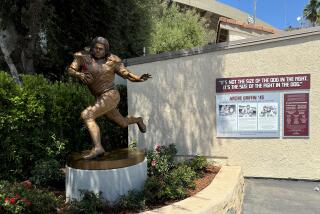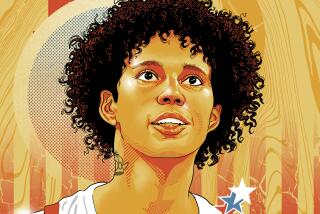Early Jump on Rivals : After Failing Drug Test in ‘88, Griffin Is Ready for Barcelona
- Share via
To the people who know him well, it’s no surprise that Eric Griffin looms as the U.S. Olympic team’s best bet for a gold medal at the Barcelona Olympic Games.
Griffin, the 5-foot-3, 106-pounder from Broussard, La., has worked for it. For example, Fred Reilly of Glendale, father of Olympic team welterweight Pepe Reilly, was in Worcester, Mass., last month for the Olympic team trials tournament. At 4:30 a.m. on the opening day of the trials, he and a couple of other fathers were jogging.
As he ran, Reilly couldn’t believe who was running toward them through the pre-dawn darkness.
Eric Griffin was completing a four-mile run, seven hours before his bout.
“I couldn’t believe it,” Reilly said. “It’s unheard of, to do roadwork on a day you compete. He’s the hardest working kid I’ve ever seen.”
Griffin, who grew up in Louisiana but now lives and trains in Jasper, Tenn., is not only the reigning amateur light-flyweight champion at 106 pounds. He has been ranked No. 1 in his weight class by amateur boxing’s world governing body, AIBA, for the last three years.
He is the only American ranked first in the world. Oscar De La Hoya of East Los Angeles is tied for second in the lightweight rankings with Artur Grigoyan of the Commonwealth of Independent States.
Griffin appears to be a boxer in the right place at the right time. His style, one accurate punch at a time, is conducive to the computer scoring system adopted in the last two years by amateur boxing.
Boxers who throw combinations, or numerous body punches, everyone seems to agree, don’t accumulate as many scoring points as those who throw one punch at a time.
“Throw punches all five judges can see,” coaches tell boxers today.
Griffin was masterful at the U.S. Olympic trials. He won two bouts by scores of 94-12 and 70-16. And at the Olympic team boxoffs last Saturday in Phoenix, he defeated his opponent, 70-14.
But four years ago, Griffin was a boxer headed in the wrong direction. At a party two weeks before the 1988 Olympic trials, Griffin smoked a marijuana cigarette.
He finished second at the trials, losing on points to Michael Carbajal of Phoenix, then was invited to challenge Carbajal at the boxoffs two weeks later at Caesars Palace.
Then, he was administered a drug test.
Griffin was disqualified, along with two other boxers who also tested positive.
They were sent home, but only after they were forced to answer questions at a humiliating news conference.
“It was like I was a drug dealer, or some kind of addict,” Griffin said, remembering the painful experience recently.
“I was never part of the drug scene. It was just one night at a party, and I did something dumb. I got an F instead of an A. But I learned a lesson. I could have given up on everything, but I didn’t.
“I went home and thought for about six months about what I wanted to do, turn pro or start all over and work toward the ’92 Olympics.”
Today, when he isn’t winning world amateur championships, Griffin delivers the anti-drug message to schools in and near Jasper, where he lives with his adviser, Bob Jordan.
Within a year of the disqualification of 1988, Griffin had become the boxer to beat at Barcelona. He won the gold medal at the 1989 World Championships in Moscow. And he put an exclamation mark to it by beating fabled Cuban Rogelio Marcelo in the final.
In 1991, he beat his chief rival, Marcelo, twice--at the USA-Cuba matches and at Sydney in the World Championships. He was the only American to win a world title in Sydney.
And at the World Championships Challenge in Tampa, Fla., in March, he routed Marcelo, 36-10.
OK, so what was he doing running seven hours before he was to box at the trials?
“I weighed 107 when I went to bed the night before and had to make 106 at 7 a.m.,” he said. “It’s just part of getting the job done.” He was 105.7 at the weigh-in.
More to Read
Go beyond the scoreboard
Get the latest on L.A.'s teams in the daily Sports Report newsletter.
You may occasionally receive promotional content from the Los Angeles Times.






